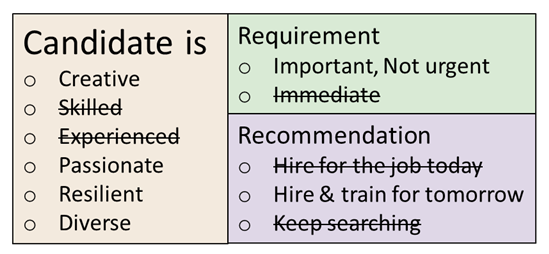Just One Skill That Matters?

There is only one skill that matters.
Really? It is the skill to develop new skills all the time, quickly.
Will industry 4.0 kill our jobs?
This is the most popular question in our panel discussions on this topic. My response is usually as follows.
“History has proven that all previous revolutions have created new higher-paying jobs, reduced the number of working hours, improved productivity and prosperity. People who were worried about jobs, and companies that were slow to adapt to the change paid the big price. We have come down from a 7-day workweek before the first industrial revolution to 5-days. I can foresee a 4-day workweek by the time we are all digitally transformed.”
… pause…
“I have lived through the 3rd revolution. My freshman engineering was using log tables, I got a calculator in Sophomore, and saw the first computer as a senior in 1985. When computers came to India, we had serious nationwide social protests, against the Prime Minister’s move to bring the technology. It was perceived as a job-killer. Most of my friends and their parents disliked my excitement with the toys. Our college took a student account at the very first computer center in the city and each one of us was given 5 minutes of CPU time on the Digital Equipment Corporation (DEC)’s PDP-10 mainframe. My allocated 5 minutes were used up within a week and then I borrowed minutes from those who were busy protesting against the computers. Today the whole economy of the country (India) and many other nations is because of the IT skills.”
… pause …
“You see, it is not a jobs question. It is a competency question. Your skills will go obsolete. You need to reskill, you need to retool, you need to relearn. To confidently try new things and new ways of doing something is the most important trait. So, don’t worry about the jobs. There will be plenty more. Worry about developing the competencies and knowledge for the jobs that will be available.”
Traditional trade skills will have to embrace the entry of new skills – some multidisciplinary blend of Digitalization, Automation, Data Scientists, Machine Learning, Machine Communication, Man-Machine interface, Additive Manufacturing, and new ones every few years. The role of data scientists is already picking up. These are specialists who will extract and prepare data, conduct advanced analysis, and apply their findings to improve products or production.
Traditional soft skills will have a higher focus on complex problem solving (identification), creativity, open mind, critical thinking, teamwork and transparency, decision making under uncertainty, robotics supervision, and more. I can see a role for a full-time Fictioneer, Ideation facilitator, Concept artist, …
Job Descriptions are dying
If you can describe your job in sufficient detail, it will soon be replaced by a robot. You need to focus on talent that can bring intellectual capability and adaptability to meet Job Expectations. Simple tasks are being taken over by robots and shop floors are getting digital. Humans now need to oversee humans and cobots together. Perhaps we will see robots supervising other robots and then humans, sooner than we think. And let us add artificial intelligence or intelligence augmentation to the mix. We now have a whole new set of challenges with talent management.
If you consider the scope of digital skills required, universities will have a difficult time adjusting. In one of my recent conversations with a University Dean, I asked him how they will adapt when their curriculum revision cycle is 3-year, because very soon the content obsolescence period will be shorter than three years. I think Industry will take charge and not rely on university degree programs.
Focus is also shifting from graduate-level college degrees to rapid certification and creating relevant competency just in time and in place. Augmented reality-based training or job instructions might further diminish the value of formal classroom trainings. From an industry perspective, HR may not be able to handle the retraining, because of scope and content. Chief Technology Officer (CTO) may have to take this one on. There will be room for new types of colleges and academies to develop talent for the digital requirements.
Creativity can be learned, it is a practiced art. A whole library of how-to books has already been written on the theme. Some of the books are better than others, but they all focus on a couple of central ideas: be open to new things, ask questions, doodle around, and create ‘firsts.’
According to the BCG[1] employees will need to shift their focus to the things machines so far can’t do, will have to be more open to change, possess greater flexibility to adapt to new roles and working environments, and become accustomed to continuous interdisciplinary learning.
The global pandemic is demonstrating the need for resiliency skills. Businesses surviving in 2020s will be those where the organizations are flexible, adaptive, and agile; constantly analyzing and adjusting. Employers might look for such skills as a requirement in the near future. These skills are not easy to teach or learn.
In Summary,
To pick up a new skill on demand is the most important skill.
Ability to do the job that cannot be described clearly, is what will keep you in the job.
If you like this blog post, you will like my book – “Inspiring Next Innovation Mindset” available on Amazon.
If you wish to engage with me in a conversation, on important innovation topic, please register for our monthly sessions at www.inspiringnext.com/events
[1] Man and Machine in Industry 4.0; M Lorenz, R Strack, K Lueth, & M Bolle; BCG Report; https://www.bcg.com/publications/2015/technology-business-transformation-engineered-products-infrastructure-man-machine-industry-4.aspx ; Sept 28, 2015.
